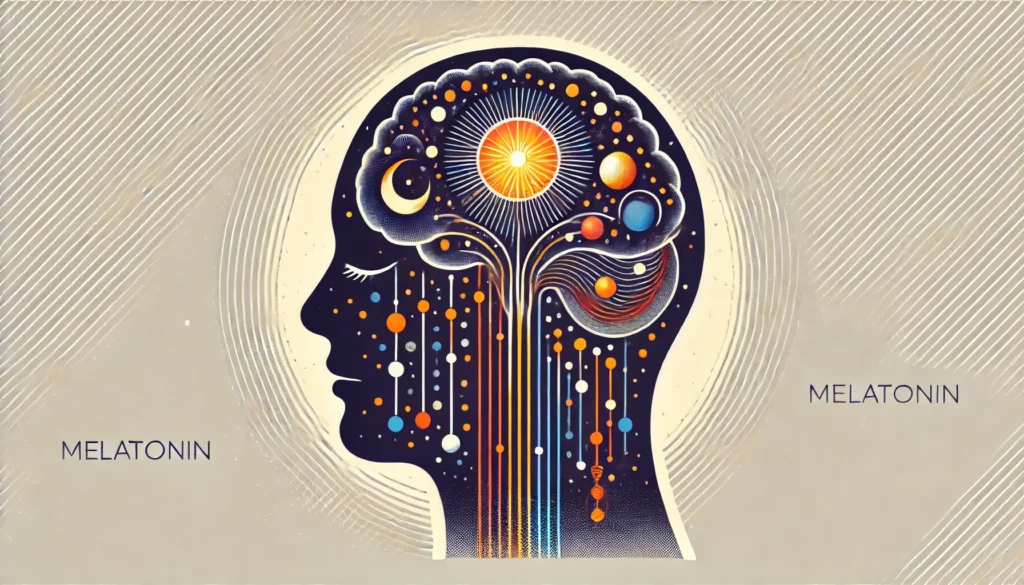In the quest for a good night’s sleep, many individuals turn to natural supplements as alternatives to traditional pharmaceuticals. Among the most popular options are melatonin and valerian root. Both are celebrated for their sleep-inducing properties, yet they function differently within the body. In this article, we will explore these two supplements, their benefits, potential interactions, and how they compare in helping you achieve restful slumber.
You May Also Like: Essential Vitamins for Better Sleep Quality
Understanding Melatonin
Melatonin is a hormone naturally produced by the pineal gland in the brain. It plays a crucial role in regulating the sleep-wake cycle, commonly known as the circadian rhythm. As daylight fades, the body increases melatonin production, signaling that it’s time to prepare for sleep.
The Production and Regulation of Melatonin
The production of melatonin is closely tied to the light-dark cycle. Exposure to light, especially blue light from screens, can suppress melatonin production, potentially disrupting sleep patterns. Understanding the environmental factors that influence melatonin can help individuals optimize their sleep hygiene.
Melatonin secretion follows a daily cycle, peaking in the evening and gradually decreasing towards morning. This rhythm can be influenced by factors such as age, lifestyle, and exposure to natural light. Recognizing these influences can aid in creating an optimal sleep environment.
How Melatonin Works
Melatonin’s primary function is to communicate to your body when it is time to sleep. It doesn’t induce sleep directly but rather helps to regulate your body’s internal clock. This makes it particularly useful for individuals dealing with jet lag or shift work disorder, where the natural sleep cycle is disrupted.
The mechanism by which melatonin influences sleep involves its interaction with melatonin receptors in the brain. These receptors help modulate the timing of sleep and wakefulness, facilitating the body’s transition into sleep. By understanding this interaction, individuals can better appreciate melatonin’s role in supporting sleep.
Benefits of Melatonin Supplementation
Studies have shown that melatonin supplements can aid those with insomnia and delayed sleep phase syndrome by reducing the time it takes to fall asleep. Additionally, melatonin has been explored for its potential benefits in managing anxiety before surgery and improving sleep in children with neurodevelopmental disorders.
Melatonin supplementation is often considered for its potential to enhance sleep quality and duration. In individuals with insomnia, melatonin may help synchronize the sleep-wake cycle, leading to improved sleep patterns. Exploring these benefits can guide individuals in selecting appropriate sleep aids.
However, it is important to note that melatonin is not a sedative, and its effects can vary among individuals. The typical dosage ranges from 0.5 to 10 milligrams, taken shortly before bedtime, but consulting with a healthcare provider for personalized advice is recommended.

Introducing Valerian Root
Valerian root, derived from the Valeriana officinalis plant, has been used as a medicinal herb since ancient times. Traditionally, it has been employed to treat insomnia, anxiety, and restlessness.
The Historical Use of Valerian Root
Valerian root’s use dates back to ancient Greece and Rome, where it was prescribed for various ailments. Its historical significance is reflected in its long-standing reputation as a natural remedy for sleep and anxiety issues. Understanding its historical context can provide insights into its modern applications.
Throughout history, valerian has been used not only for sleep but also for conditions such as nervousness and tension. Its calming effects have made it a popular choice in traditional medicine practices across different cultures. Exploring these traditional uses can enhance our understanding of valerian’s role in contemporary wellness.
How Valerian Root Works
Valerian root contains several compounds believed to promote relaxation and sleep. These include valerenic acid, isovaleric acid, and a variety of antioxidants. It is thought to work by increasing levels of gamma-aminobutyric acid (GABA) in the brain, a neurotransmitter that reduces nerve activity and promotes calmness.
The interaction between valerian compounds and GABA receptors is a key factor in its sedative effects. By enhancing GABA activity, valerian may help calm the nervous system, making it easier to fall asleep. Delving into this mechanism can clarify how valerian supports relaxation and sleep.
Benefits of Valerian Root Supplementation
Valerian root is often used to improve sleep quality, particularly in individuals who experience difficulty falling asleep. Some studies suggest that valerian may reduce the time it takes to fall asleep and enhance sleep quality, though results are mixed.
Valerian root may also be beneficial for reducing anxiety, which can often interfere with sleep. By alleviating anxiety symptoms, valerian may contribute to more restful and uninterrupted sleep. Examining these potential benefits can assist individuals in choosing valerian as a sleep aid.
Moreover, valerian root is sometimes used in combination with other calming herbs, such as hops or lemon balm, to enhance its effects. As with any supplement, starting with a low dose and gradually increasing as needed is advisable, under the guidance of a healthcare provider.
Melatonin vs. Valerian: Key Comparisons
When comparing melatonin and valerian root, it is essential to understand that they serve different purposes and can be used in conjunction for some sleep issues.
Mechanism of Action
- Melatonin: Regulates the sleep-wake cycle by signaling to the body that it is time to sleep.
- Valerian Root: Promotes relaxation by increasing GABA levels, which can help you fall asleep more easily.
Melatonin’s role in regulating circadian rhythms contrasts with valerian’s calming effects through GABA modulation. Understanding these mechanisms can help individuals select the appropriate supplement based on their sleep challenges.
Ideal Use Cases
- Melatonin: Best for addressing disruptions in the circadian rhythm, such as jet lag or shift work.
- Valerian Root: More effective for those who have trouble falling asleep due to anxiety or restlessness.
Considering the unique properties of melatonin and valerian, individuals can tailor their supplement choices to address specific sleep issues. Evaluating these use cases can guide individuals in making informed decisions about their sleep aids.
Side Effects and Interactions
Melatonin is generally considered safe for short-term use, with minimal side effects, including drowsiness or dizziness. However, long-term effects remain under-researched.
Valerian root, while also relatively safe, may cause mild side effects like headaches, dizziness, or stomach upset. It is crucial to be cautious when combining valerian with other sedatives, as it can enhance their effects.
Potential Drug Interactions
Melatonin and valerian root may interact with other medications or supplements. Melatonin, for instance, can affect the efficacy of blood pressure medications, while valerian may interact with sedatives or antidepressants. Consulting healthcare providers is vital for avoiding adverse interactions and ensuring safe use.

Can You Take Valerian Root with Melatonin?
The question of combining valerian root with melatonin often arises for those seeking to maximize their sleep benefits. While there is limited research on the synergistic effects of taking both, some individuals report enhanced sleep quality when using them together.
Combining valerian and melatonin may offer complementary benefits, with melatonin regulating sleep timing and valerian promoting relaxation. However, individual responses can vary, and it is essential to consider personal health conditions and potential interactions.
It is important to consult a healthcare provider before combining supplements, as they can offer guidance tailored to your health needs and help avoid potential interactions with other medications.
Practical Advice for Using Melatonin and Valerian
- Start Low: Begin with the lowest recommended dose of either supplement and increase gradually if necessary.
- Consistency is Key: Use supplements consistently for several days to assess their effectiveness.
- Monitor Effects: Keep track of your sleep patterns and any side effects to discuss with your healthcare provider.
Establishing a Routine
Incorporating melatonin or valerian into a nightly routine can enhance their effectiveness. Consistency in timing and dosage can support the body’s adaptation to these supplements, promoting better sleep outcomes.
Tailoring Dosage to Individual Needs
Individuals may respond differently to melatonin and valerian, making personalized dosage adjustments important. Starting with a low dose and monitoring effects can help tailor supplementation to specific sleep needs.
Consulting Healthcare Professionals
Professional guidance can provide personalized recommendations for using melatonin and valerian. Healthcare providers can help navigate potential interactions and suggest appropriate dosages based on individual health profiles.
Future Implications and Trends
As interest in natural sleep aids grows, ongoing research continues to explore the efficacy and safety of supplements like melatonin and valerian root. Advances in understanding individual responses to these supplements may lead to more personalized sleep solutions in the future.
Innovations in Sleep Technology
Emerging trends in health and wellness, such as biohacking, are driving innovations in how individuals optimize their sleep. This includes integrating technology with traditional practices to enhance sleep quality and overall well-being.
Personalized Sleep Solutions
Advancements in genetic testing and personalized medicine are paving the way for tailored sleep interventions. Understanding genetic predispositions can help refine melatonin and valerian supplementation strategies to suit individual needs.
The Role of Lifestyle Factors
Lifestyle factors, such as diet, exercise, and stress management, play a significant role in sleep quality. Combining melatonin and valerian supplementation with healthy lifestyle practices can offer comprehensive support for sleep challenges.

Conclusion
Melatonin and valerian root offer promising solutions for those seeking to improve their sleep naturally. While they work through different mechanisms, both can be effective in addressing specific sleep challenges. By understanding their unique properties, you can make informed decisions about which supplement, or combination thereof, may best support your journey to restful sleep.
Always remember to consult with a healthcare provider before starting any new supplement regimen, especially if you have underlying health conditions or are taking other medications. Sleep well and wake refreshed!
Further Reading:
Valerian Root vs. Melatonin: Pros and Cons of Both Sleep Aids
New perspectives on the role of melatonin in human sleep, circadian rhythms and their regulation
Important Note: The information contained in this article is for general informational purposes only, and should not be construed as health or medical advice, nor is it intended to diagnose, prevent, treat, or cure any disease or health condition. Before embarking on any diet, fitness regimen, or program of nutritional supplementation, it is advisable to consult your healthcare professional in order to determine its safety and probable efficacy in terms of your individual state of health.
Regarding Nutritional Supplements Or Other Non-Prescription Health Products: If any nutritional supplements or other non-prescription health products are mentioned in the foregoing article, any claims or statements made about them have not been evaluated by the U.S. Food and Drug Administration, and such nutritional supplements or other health products are not intended to diagnose, treat, cure, or prevent any disease.


